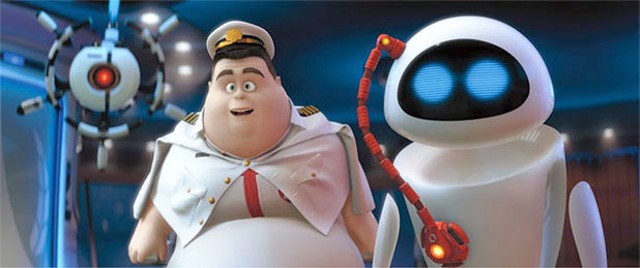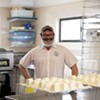Published July 30, 2008 at 6:13 p.m.
As glowing reviews and booming box office returns greet the movie WALL-E, Pixar's summer release has also inspired an unusual outpouring of debate over the animated feature's message. Much of the story - warning: spoilers ahead - unfolds wordlessly, which perhaps abets multiple interpretations. A cautionary tale about the dangers of overconsumption, or a fable about the human need to connect? Within the debate, a nasty food fight has erupted over the depiction of people and their eating habits 700 years in the future.
I took in a recent screening to evaluate some of the angrier accusations against Pixar. In the midst of a childhood obesity epidemic, does a kids' movie really ridicule fat folks? Does it blame the planet's demise on an addiction to junk food?
In the story, plucky WALL-E is the last robot left on Earth's post-apocalyptic landscape. The trash-compactor dutifully piles garbage - largely the detritus of global mega-corporation Buy N Large - into giant towers. Humans have evacuated the planet seven centuries earlier on BNL's space cruise ship, Axiom, after the atmosphere became too toxic to support life.
A resilient cockroach buddy (who sleeps in a Twinkie) and a videotape of Hello, Dolly help WALL-E stave off loneliness. When a sleek robot named EVE arrives by spaceship from Axiom, WALL-E is smitten. The musical's scenes of singing, dancing and romancing have made him yearn for companionship. Once EVE fulfills her mission on Earth, the spaceship takes her "home," to Axiom. As it departs, the lovelorn WALL-E latches onto the outside of the ship and hangs on until it docks.
The humans on Axiom are fat. Not just a little chunky, but chin-melting-into-the-neck big. They don't walk, work or do anything for themselves, because robots meet their every need. People move around seated in giant lounge chairs, laden with remote controls, and interact through monitors floating in front of them.
Cheery billboards remind them to consume - Lunch in a Cup! Cupcake in a Cup! Food comes in Big Gulp-like containers, which overtly mimic the color and design of 7-11's infamous supersized beverages. People enjoy constant pampering at robot beauty salons, but the red and blue unitards don't conceal their considerable curves. Brief glimpses of historical images show normal body sizes when humans first arrived in space. Clearly, they've evolved their amorphous shape over centuries.
"The new Pixar movie goes out of its way to equate obesity with environmental collapse," screams the headline of Daniel Engber's recent column in Slate. The online magazine's associate editor interprets WALL-E's message as: "If we don't change the way we live, we'll all get really fat and destroy the world." Citing a stream of recent research that counters conventional scientific understanding of obesity, he dismisses and decries "Pixar's dystopic vision of our fat future, in which puffed-up bodies are played for cheap laughs."
Even more outraged are the doyennes of the "fat acceptance" movement, which rejects weight loss and celebrates large bodies. They started complaining to Disney months before the film's release, based on reports from early test screenings, about what they perceived as fat bashing in WALL-E. Activist Marilyn Wann, publisher of the magazine Fat!So?, told the Sunday Telegraph of London earlier this month, "It's the classic stereotype that fat people are stupid, smelly, lazy, disgusting and out of control . . . Pixar should be out of business for portraying this level of prejudicial bigotry-mongering."
I'm not certain Engber and Wann saw the same movie I did. In fact, I'm pretty sure Wann didn't see WALL-E at all. For starters, Axiom's residents are fastidiously tidy, with plenty of time for primping while a fleet of robots rigorously cleans the ship. Axiom's inhabitants live shiny, neat and in-control lives, and keep themselves very busy with recreational pursuits. Their eating habits - admittedly bad, from our perspective - result from BNL's all-encompassing corporate domination rather than gluttony.
In fact, obesity itself never becomes a target of humor in WALL-E. The average TV sit-com episode has more fat jokes before the first commercial break.
Prolonged time in space explains the change in size and shape. In one scene, Axiom's captain (voiced by actor Jeff Garlin) reviews a brief video from BNL's CEO, who diagrams how the skeleton becomes skimpy the longer the humans are removed from Earth's gravity.
WALL-E director Andrew Stanton drew on NASA research about theoretical extended Mars missions, disuse atrophy and osteoporosis to create the Jello-like visual, he recounts in an interview with ComingSoon.net. "I actually tried to avoid obesity. I wanted blobs, I wanted babies," Stanton recalls. Technology means people "have everything solved for them. We don't have to farm anymore, we don't have do all these things that make us get up and survive." Progress, not laziness, leads to their predicament.
Watching the movie, I listened closely for any laughter directed at the fat characters. There was none at the Friday matinée showing I attended in Williston, with an audience ranging in age from toddlers to grandparents. When the lights came up, I chatted with the family of five from Vergennes sitting in front of me: Christopher and Karen White and their three daughters, Anna, 14, Sarah, 11, and Hailey, 9. Hailey crystallized the family's review of the movie: "It was really funny!"
The Whites expressed genuine surprise when I described the controversy. The depiction of overweight characters made Christopher feel "empathy, because there was a certain sadness to it," he said. "They've been blinded by the big business and their consumer message," with virtual-reality screens in front of them, and have "lost their way." The movie doesn't make obesity the "focus of ridicule," Christopher pointed out. "On the contrary, it says, 'We are subject to outside influences.' And sometimes we don't have the good judgment to stand up and say, 'No, this is not the person I want to be.'"
Christopher said he thinks WALL-E is a satirical cautionary tale, "a worst-case scenario of what some of our bad habits could progress to if gone unchecked." But he added enthusiastically, "It was done with great humor and warmth. And ultimately there was a redeeming factor of our having enough awareness to see how far we had fallen and to take the Earth back and start again afresh, learning from our lessons."
For Karen, the environmental theme was trumped by something else. "The people got that way not just from eating everything in a cup, but it was their lack of engagement with everything," she remarked. "When there was an opportunity to be startled out of that . . . the human spirit will prevail." A lesson that robots, ironically, teach the people.
Like the Whites, I enjoyed the film immensely. As someone who has wrestled with weight and body-image demons her whole life, I have no tolerance for mocking the serious issues surrounding food, fitness and being fat. WALL-E didn't do that. It did remind me, however, that I spend too much time in front of my own virtual-reality screen - my computer. And the scenes of WALL-E reaching out to hold EVE's "hand," I'll admit, actually put a lump in my throat.
More By This Author
Speaking of...
-

Q&A: Howard Fisher Delivers Meals on Wheels With a Side of Good Cheer
Dec 20, 2023 -

Video: Howard Fisher Delivers Meals on Wheels
Dec 14, 2023 -

Next Month Brings the Final Curtain for Palace 9 Cinemas
Oct 27, 2023 -

'We Must Act Now': Burlington Council Passes Resolution on Drug Crisis, Public Safety
Oct 11, 2023 -

Q&A: Alexis Dexter Rescued 57 Shelter Cats During the July Flood
Sep 13, 2023 - More »
Comments
Comments are closed.
From 2014-2020, Seven Days allowed readers to comment on all stories posted on our website. While we've appreciated the suggestions and insights, right now Seven Days is prioritizing our core mission — producing high-quality, responsible local journalism — over moderating online debates between readers.
To criticize, correct or praise our reporting, please send us a letter to the editor or send us a tip. We’ll check it out and report the results.
Online comments may return when we have better tech tools for managing them. Thanks for reading.














































